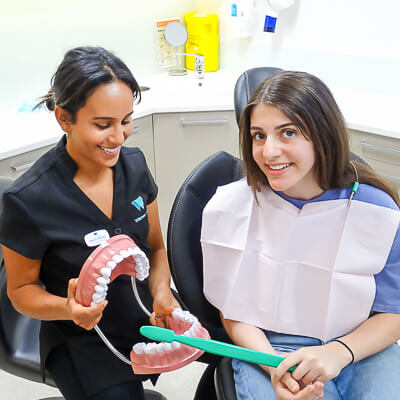Oral Hygiene in Kew
Scrupulous oral hygiene is key to preventing everyday complications like cavities, gingivitis and gum disease. Without it, teeth can easily decay and gums become infected, leading to bone and tooth loss.
Brushing
 Of course, an essential part of your oral hygiene routine is brushing. Here are our tips for making the most out of your brushing technique:
Of course, an essential part of your oral hygiene routine is brushing. Here are our tips for making the most out of your brushing technique:
- Use small circles to brush your teeth, reaching the gum line at every circle.
- Use a soft-bristled toothbrush and brush for two minutes twice a day, morning and night.
- If you have sensitivity, you may be brushing too hard. Focus on the quality of your brush, not the quantity or the pressure.
- Spit, don’t rinse and use a fluoride toothpaste.
- Switch your toothbrush every three months as the bristles can become worn by then and won’t clean as effectively.
Cleaning Between Your Teeth
Brushing alone can’t remove debris between teeth. That’s why we recommend using a flosser or interdental brush, which may make cleaning between your teeth easier. We recommend flossing once every night, getting between teeth and reaching under the gum line.
Avoid using toothpicks as these may traumatise your gums. If you notice bleeding, that may mean an early indicator of gingivitis. Gums that bleed after flossing also could indicate that you may need to floss more frequently. Be sure to let your dentist know if your gums bleed after flossing.
Just as you take your car in for routine maintenance to keep it running smoothly so you can avoid costly repairs, it’s essential to get your teeth tuned up twice a year. We focus on prevention at these visits. Coming in every six months may help you avoid costlier dental issues down the track.
Monica Ramzy, our oral health therapist, will tailor an oral hygiene routine to suit each patient’s particular situation. Monica can check to make sure you’re brushing and flossing correctly.
Taking care of your teeth will be more challenging once you get braces. Braces have numerous small spaces to trap food, which causes plaque. Then this plaque can lead to various other dental problems.
Because of this, it’s crucial to brush your teeth after every meal, including snacks and to floss at least once a day.
It’s also essential to come in for checkups and cleans when you have braces. We can tag a hygiene appointment onto your orthodontic one. Each patient’s orthodontics treatment is tailored to their individual situation and the same applies to our advice around your oral hygiene too.
To keep your mouth healthy, remove your dentures at night and leave them out to dry. Always make sure to brush and rinse your dentures a few times a week using a denture cleaning solution or tablet.
You also should brush your gums, tongue and palate using a soft-bristled brush every morning before putting your dentures in.
Many parents wonder at what age they should bring their child in for dental care. We recommend when they’re 2. It’s a good idea to get them familiarised with our friendly practice environment. Our warm and caring team will help your child feel comfortable.
Only use a pea-sized amount of toothpaste and make sure they don’t swallow it. Once children can tie their shoelaces, they can brush by themselves. After their 6-year molars have come in and they have enough adult teeth, you can introduce adult toothpaste.
FAQs
Isn’t home care good enough to keep my teeth clean?
What are sealants and why are they beneficial?
Book an Appointment
Use our convenient online booking system to schedule your next oral hygiene appointment at Willsmere Dental in Kew!
Contact Us
* Any surgical or invasive procedure carries risks. Before proceeding, you should seek a second opinion from an appropriately qualified health practitioner.


